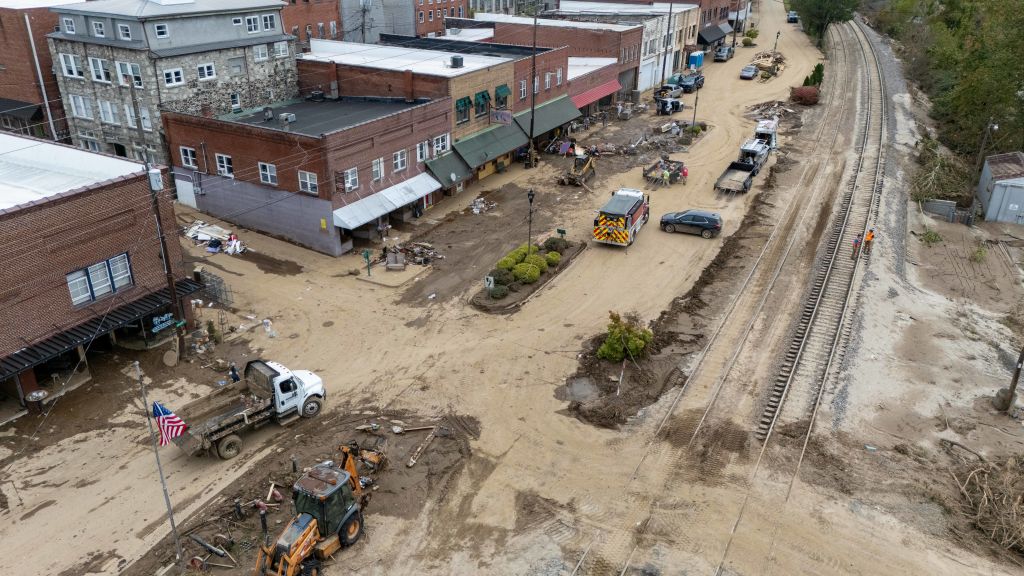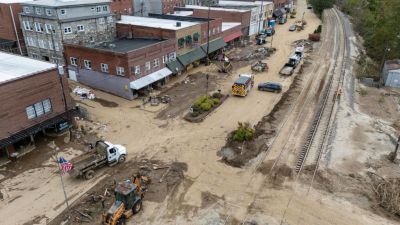A viral TikTok video claims that flooding in North Carolina was caused by the release of water from a dam, not from Hurricane Helene.
“Makes since [sic]! How can a town, 2000ft in elevation, flood 20ft?? North Carolina was flooded when Duke Energy Released water from Dam,” reads text overlaid on a video of a dam releasing floodwaters. “Makes sense when you know BlackRock owns Duke Energy I knew they released the dams this is for the ones who don’t believe,” reads the caption of one repost of the video on Facebook.
The claim is false: Flooding in North Carolina was caused by rainfall, not by an intentional release dam.
The video included in the post was shot by ABC affiliate WSOC and depicts floodwater being released from the Cowans Ford Dam in Stanley, North Carolina, on September 27, following several days of heavy rain. The dam is part of North Carolina’s largest hydroelectric plant and sits at the base of Lake Norman, a reservoir fed by the Catawba River running from western North Carolina.
While the Cowans Ford Dam did release floodwaters during the hurricane, it and its reservoir are downstream of the areas of North Carolina that experienced substantial flooding, meaning the floodwater release actually helped alleviate flooding in the western half of the state. Lake Norman is located about 18 miles northwest of Charlotte, in a part of the state that was not heavily affected by Helene. Precautionary evacuations did occur downstream of Cowans Ford as fears arose that floodwaters might overwhelm the dam, and the area surrounding Riverside Drive on the shore of Mountain Island Lake—which sits below Lake Norman—experienced substantial flooding.
Duke Energy, which manages much of the state’s energy infrastructure, including Cowans Ford Dam, began preparing for potential flooding as soon as it anticipated Helene’s arrival. “Duke Energy’s hydro operations team began lowering lake levels at our Duke Energy lakes to create as much storage as possible ahead of the rain event,” Jennifer Garber, director of communication for Duke Energy told The Dispatch Fact Check in an email. “Lakes are managed as an integrated system and water management in one lake can impact the others, so it is important that lake levels decline slowly and in a controlled manner to help mitigate or reduce flooding risks. We do this by moving water through our generating units and operating our spillways and flood gates, where possible.”
While Duke Energy also manages a small number of hydroelectric plants in western North Carolina, its infrastructure there performed as expected. “We did not experience any issues with our dams, spillways, or floodgates because of the storm,” Garber said.
Some dams in the state, however, fared worse than those managed by Duke Energy. During the hurricane, officials in Lake Lure reported that the lake’s dam, which is owned by the town, was at imminent risk of failure due to heavy rainfall from Helene. By September 29, however, the dam was deemed stable by engineers on site. “Some damage to the abutments and downstream area occurred, and plans are underway to repair these areas. The lake is being operated at a lower level until the repairs can be made, but there are no ongoing concerns associated with dam failure,” the town reported in a press release.
The post’s claim that Duke Energy is owned by BlackRock is also misleading. BlackRock—the largest asset management company in the world—is a leading shareholder of the company, but owns only about 7.5 percent of its stock. Vanguard—another large asset manager—owns approximately 9 percent of the company, and other prominent financial institutions also hold millions of shares. Because many of their products invest broadly across the entire stock market, asset management firms like BlackRock and Vanguard are leading shareholders in most publicly traded companies in the U.S. As a result, the two firms—and BlackRock in particular—are often linked to various conspiracy theories.
If you have a claim you would like to see us fact check, please send us an email at factcheck@thedispatch.com. If you would like to suggest a correction to this piece or any other Dispatch article, please email corrections@thedispatch.com.






Please note that we at The Dispatch hold ourselves, our work, and our commenters to a higher standard than other places on the internet. We welcome comments that foster genuine debate or discussion—including comments critical of us or our work—but responses that include ad hominem attacks on fellow Dispatch members or are intended to stoke fear and anger may be moderated.
With your membership, you only have the ability to comment on The Morning Dispatch articles. Consider upgrading to join the conversation everywhere.